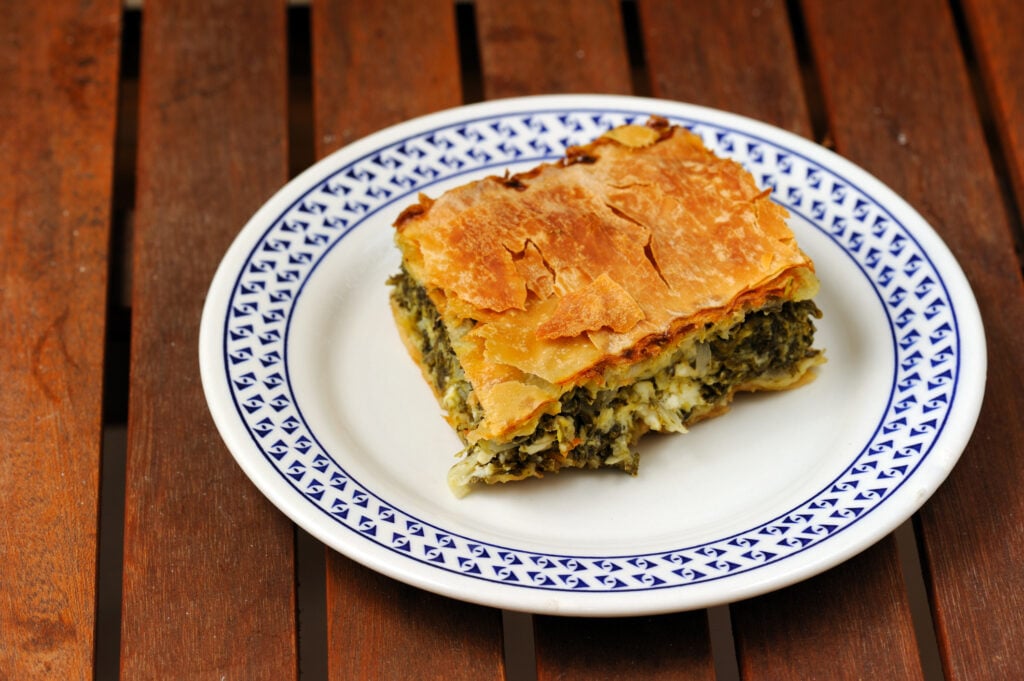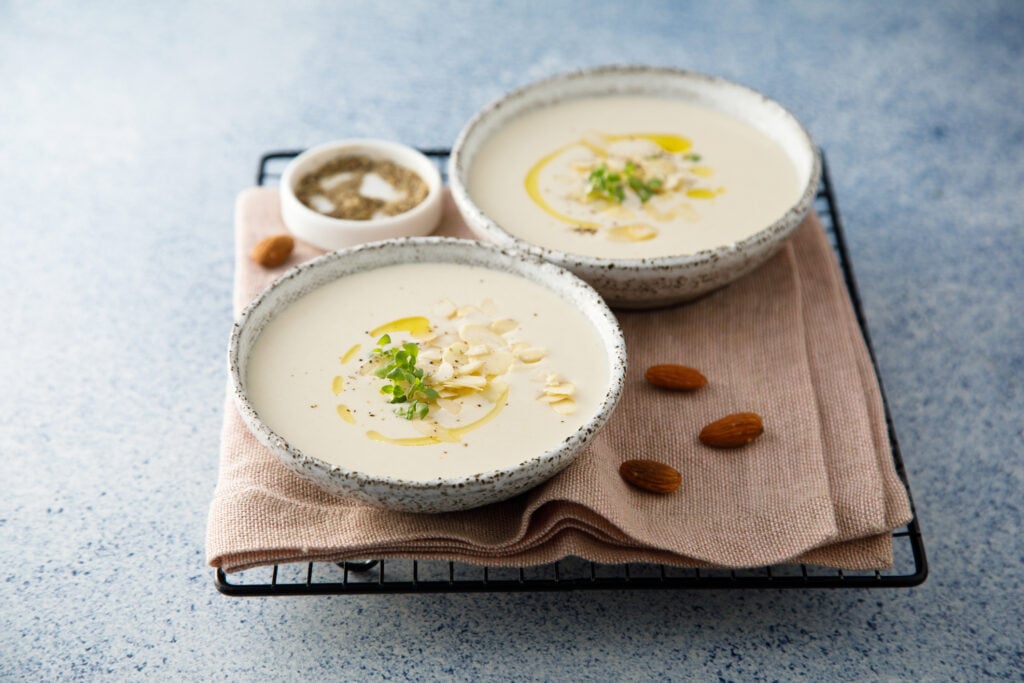Easy Recipes and Health Benefits of these Popular Items
One of the time-tested ways to keep your brain sharp also happens to be one of the most delicious. For decades, scientists have been documenting the relationship between the Mediterranean diet and a lower risk of cognitive decline. When it comes to the Mediterranean diet, the whole is greater than the sum of its parts. It is not just about one food, but all of the healthy food groups working in tandem to optimize nutrition and flavor! Below, we’re spotlighting five brain-healthy foods from the Mediterranean Diet Pyramid while recognizing that many other Mediterranean diet ingredients (like spices, herbs, fruits and beans) are also important to nourish you from head to toe.

Seafood
Seafood is brain food. Just as calcium is a building block of bones, DHA, an omega-3 fatty acid found primarily in seafood, is a building block of our brains. Seafood also contains a multitude of other brain-healthy nutrients, like the omega-3 fatty acid EPA, as well as numerous essential vitamins and minerals. People who eat more seafood tend to have more beneficial gray matter in their brains and a lower risk of cognitive impairment. Omega-3 fatty acids have also been found to be incredibly important for mental health.
On the Mediterranean Diet Pyramid, seafood is depicted just above the plant foods, indicating that it is eaten often, at least twice per week. For a simple yet elegant Mediterranean meal, try roasting a fillet of white fish with olive oil, tomatoes, and olives. Spicy Salmon is a fan-favorite seafood dish, while Nicoise Tuna Salad and Sardine Patties pack a delightful flavor punch using affordable pantry ingredients.
Olive Oil
One would be hard-pressed to find a dish in the Mediterranean that has not been prepared with olive oil. Although this flavorful and antioxidant-filled ingredient is best known for its cardiovascular benefits, it is also an important part of a brain-healthy diet, as heart health is closely linked to brain health. In a study of 92,383 adults (average age 56), those eating at least half a tablespoon of olive oil per day had a 28 percent lower risk of dementia-related death compared with those who never or rarely consumed olive oil over the 28-year study period.
Olive oil is depicted at the base of the Mediterranean Diet Pyramid alongside other healthy plant foods, indicating that it is used daily, as part of virtually every meal. Get in the habit of reaching for olive oil as your primary cooking oil for each and every meal of the day. From Shakshuka at breakfast to a Moroccan Bulgur and Chickpea Salad at lunch, to Greek Mousakka at dinner, to an Olive Oil Cake for dessert, the possibilities are endless.
Green Leafy Vegetables
Easy to grow and easy to cook, leafy greens like kale, spinach, chard and dandelion greens are eaten all along the Mediterranean, and appear at the base of the Mediterranean Diet Pyramid alongside other plant foods and olive oil. These antioxidant-packed vegetables help to nourish our bodies and brains. In a study of more than 950 older adults, people who ate just one to two servings of leafy greens per day had the cognitive ability of a person 11 years younger than those who ate none. Research has also found that eating more vegetables and fruits at midlife is associated with a lower risk of poor cognitive function 20 years later.

No matter which Mediterranean flavors you’re drawn to, you’re sure to find a delicious leafy green dish prepared in a way that makes the ingredients sing. The Cyclades islands in Greece are famous for their savory pies filled to the brim with leafy greens. Orecchiette Con Cime Di Rape is an Italian dish in which greens like broccoli rabe or turnip tops are cooked and tossed with pasta. Spinach Lamejun is a delicious Eastern Mediterranean flatbread topped with greens and halloumi cheese.
Whole Grains
Whole grains, grain foods that contain all of their healthful bran, germ and endosperm, are an important part of a brain-healthy Mediterranean diet. These nutritional powerhouses are depicted at the base of the Mediterranean Diet Pyramid as a core food group of every meal.
In a study of 2,958 adults in the U.S., those eating the most whole grains were 28 percent less likely to develop all-cause dementia and were 36 percent less likely to develop Alzheimer’s dementia over the 12-year study period. Similarly, another study found that older adults eating three or more servings of whole grains per day had a slower rate of decline in global cognition, perceptual speed, and episodic memory compared to those who ate fewer than one serving per day. Research shows that people who eat more whole grains are also more likely to have better mood, depression and anxiety scores.
Though refined grains like all-purpose flour, which have been stripped of the healthful bran and germ, have become more commonly available over the past several decades, whole grains remain a cherished part of Mediterranean food traditions. Kisir, a Turkish dish, and Tabbouleh, a Lebanese dish, are both fragrant salads made with herbs and bulgur, a quick cooking whole grain wheat. Other delicious Mediterranean-inspired dishes made with whole grains include Brown Rice Risotto, Herby Barley and Cannellini Bowls with Leeks and Mushrooms, Whole Grain Pasta with Peas, or even something as simple as Mediterranean Chicken Salad Sandwiches on whole wheat bread.
Nuts

Nuts and seeds thrive in both sweet and savory applications all throughout the Mediterranean region, and they also pack a nutritional punch. In a study of over 4,000 adults aged 55+, those with the highest intake of nuts had a significantly higher cognitive function than those who ate a moderate amount of nuts, or no nuts at all. Tree nuts are not the only nuts for your brain, though. In a study of healthy young adults in the Mediterranean, those eating peanuts or peanut butter daily over the six-month study were significantly more likely to have improved anxiety and improved immediate memory.
The Mediterranean Diet is a lovely blueprint for how to enjoy nuts and seeds daily, as part of a brain-healthy diet. Pesto is a traditional Italian sauce made from basil, garlic, olive oil, nuts and aged cheese, and can be customized with any type of nuts you have on hand. Nuts also show up in the Spanish soup Ajo Blanco, in a Grain Salad with Tomatoes and White Beans, or atop Roasted Carrots with Pistachios and Tahini Yogurt. For a special treat, we’d be remiss not to mention Tarta de Santiago, a traditional almond cake found throughout Santiago de Compostela, Spain.
Take a cue from the Mediterranean Diet Pyramid to balance your meals with brain-boosting ingredients. And don’t forget to enjoy meals with family, friends and loved ones, as pictured on the pyramid. These social ties are also important for healthy aging, and they “season” our meals with conversation and connection.


 Oldways
Oldways